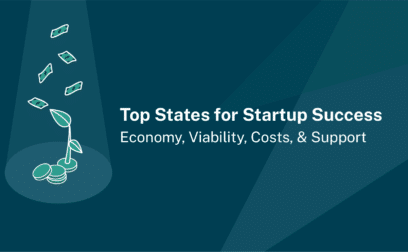TABLE OF CONTENTS
While bright ideas, innovation and determination are all great drivers of small business, funding is often the trick that sets successful businesses apart from others. Entrepreneurs have many options for small business loans in Virginia, from traditional bank loans and lines of credit to venture capital and merchant cash advances.
Applying for small business financing can seem daunting, but with research and preparation, business owners throughout the state can secure the funding they need with the best possible terms.
Explore small business loans in Virginia, as well as alternatives and tips, in our guide.
A wide variety of lenders and investors serve Virginia’s thriving business environment. Business owners can access a diverse selection of traditional small business loans in Virginia, including traditional bank loans, lines of credit and loans backed by the U.S. Small Business Administration (SBA).
Online brokerages like Swoop also offer access to a variety of traditional loans, plus alternative solutions that may be a better choice for certain needs. Invoice funding, merchant cash advances and equity investor deals are a few of the many options you can tap through online brokerages.
Whichever path you choose, you can find funding for all types of small business needs, including:
Some companies can also qualify for specialty small business loans in Virginia backed by economic development groups and private foundations. The Virginia Small Business Financing Authority (VSBFA) offers a variety of small business loan programs, plus business grant opportunities for Virginia-based businesses.
VSBFA funding programs have specific requirements, so not every business will qualify. However, it’s a good place to start your search for a small business loan in Virginia. They also offer training, events and other resources to help your small business.
Virginia’s small businesses and nonprofit organizations can also seek funding through business grants. Grants are typically backed by the government or private foundations and available to companies and organizations that meet specific criteria. They’re very popular because they don’t have to be repaid; however, this also means that they tend to be extremely competitive, too.
Most small business grants in Virginia are designed to support organizations that contribute to the betterment of the local community. Grants commonly center on housing developments, community renewal programs and non-profit educational or arts ventures. Organizations that serve these industries or meet women or minority-owned criteria may be eligible for grant funding in Virginia.
To explore business and nonprofit grant opportunities in Virginia, start with the following:
Securing a small business loan in Virginia takes time and every loan program may have specific requirements. Breaking the process into five steps can help you prepare for a loan application.
Carefully research lenders, loan products and alternative funding sources before applying. Spending time preparing and exploring all your options can pay off big, especially if you’re looking for quicker approval and the best possible terms.
Virginia-based businesses can also tap non-traditional financing to fund startups, working capital and growth. Several types of funding have been around for years, including invoice financing (also called factoring), merchant cash advances, equity investment and convertible debt deals.
These options were not readily accessible in the past. But thanks to online brokerage platforms like Swoop, alternative funding is available to small businesses throughout Virginia and the U.S. With simple applications, fast approvals and flexible terms, alternative options offer quicker access to cash than traditional business loans.
Virginia-area businesses can also obtain funding through crowdfunding and peer-to-peer programs, also known as marketplace lending. These online platforms connect businesses with individual or group investors and handle all the details, from investment transfers and share tracking to shareholder payments.
The credit requirements for small business loans in Virginia vary depending on the loan type and amount and the business’s financial health. The creditworthiness of the business owners or principals is also taken into account since these loans typically require a personal guarantee.
A credit score of 680 or above, considered “good” credit, puts business owners in a strong position when applying for a small business loan in Virginia. Paired with sound business financials and forecasts, a credit score of 680 or above can help you land a small business loan in Virginia with favorable terms and lower interest rates.
Even if the owners or principals don’t meet the preferred 680 credit threshold, securing a business loan in Virginia is still possible. Loan underwriters consider the business’s financial health, assets and revenue projections as well as credit scores. A company with a solid track record can still qualify for a loan despite the principals’ low personal credit scores. However, the loan might come with a higher interest rate and tighter terms.
To ensure you receive the best terms and interest rate, work to improve your credit score and business finances before applying for a small business loan in Virginia.
Applicants can expect to see interest rates between 6% and 20% on average for small business loans in Virginia. Interest rates are based on several factors, including personal credit scores, the business’s financial health, the purpose and amount of the loan and the value of assets attached as collateral. Economic or market conditions also play a role in determining interest rates, such as interest rates for SBA loans, which are tied to the U.S. Prime Rate.
When assessing risk and rates, lenders consider the age of the business and its financial stability and assets. Even with good personal credit scores, a new or struggling business will typically pay higher interest rates than established, profitable companies. Loans with assets attached as collateral, such as equipment, vehicle or real estate loans, generally have lower rates than unsecured startup and working capital loans.
Virginia-based businesses needing occasional quick funding might consider merchant cash advances and invoice funding. These inject cash based on accounts receivable or average credit card sales and are often more accessible or affordable than working capital or cash flow loans.
Traditional bank, nonbank and SBA loans can take between two weeks to six months for processing, approval and funding. Business owners can speed up the process by having their business financials in order and shoring up their credit scores before applying.
Online brokerages such as Swoop can deliver quicker approvals than traditional banks. These platforms specialize in matching applicants to lenders that service specific types of clients and loan products. Unlike most banks, many online platforms offer quick-funding merchant cash advances and invoice funding, plus connect businesses with investor and grant opportunities.
An online brokerage platform such as Swoop can be a good first step to securing the best funding for your Virginia-based business. These platforms let you explore all types of loans and alternative financing options in one place, plus easily compare rates and terms.
Business bankers and small business organizations that provide financing guidance and grant opportunities are also sources to tap. Leverage your network – talk to other business owners and attend industry events whenever you can. You never know where you will find the perfect funding solution.
When reviewing funding options, it’s important to understand every detail of the deal. This includes the loan type and terms, interest rate, funding amount, payments, fees, early payoff penalties, equity stakes and personal guarantees. A line-by-line comparison of the final options will help you pick the best financing with the most favorable terms.
Swoop’s online brokerage platform simplifies the hunt for small business funding. From traditional loan and equity investors to merchant cash advances and grants, Swoop delivers small business financing options that fit virtually every need.
Plus, Swoop clients can enjoy savings on all types of business expenses, from banking fees to utility bills. See all the ways that Swoop can help you keep more of your hard-earned money. Get started today.
Daire made it happen! There is no doubt that Swoop sped up the process and found lenders that worked to our time scale rather than the other way round
Hocque Figureoa
Joint owner, F45 Virginia
Swoop was actually very helpful in helping us get our initial fundraising in place. Swoop was able to connect us with investors, with grant financing options and debt financing options.
Viler Lika
Founder, SingleKey
Pedja was amazing. Super supportive, understanding of our needs and wasn't pushy at all. We've been going back and forth with Swoop for over a year inquiring about different financing options and they were patient until we were ready!
Chris Skeates
F45 Multi-studio owner
Join the 95,000+ businesses just like yours getting the Swoop newsletter.
Free. No spam. Opt out whenever you like.
Kingfisher Way, Silverlink Business Park, Newcastle upon Tyne, NE28 9NX, UK
View in Google Maps35 Bull Street, Lewis Building, Birmingham B4 6AF, UK
View in Google MapsAberystwyth Innovation and Enterprise Campus
Gogerddan Campus
Aberystwyth University
Ceredigion
SY23 3EE
Dogpatch Labs, The CHQ Building, Custom House Quay, Dublin, Ireland
View in Google MapsSuite 801, Level 8, 84 Pitt Street, Sydney, NSW 2000, Australia
View in Google Maps43 W 23rd St, New York, NY 10010, United States
View in Google Maps21 Dreyer Street, Cape Town, South Africa, 7708
View in Google MapsClever finance tips and the latest news
Delivered to your inbox monthly
Join the 95,000+ businesses just like yours getting the Swoop newsletter. Free. No spam. Opt out whenever you like.




